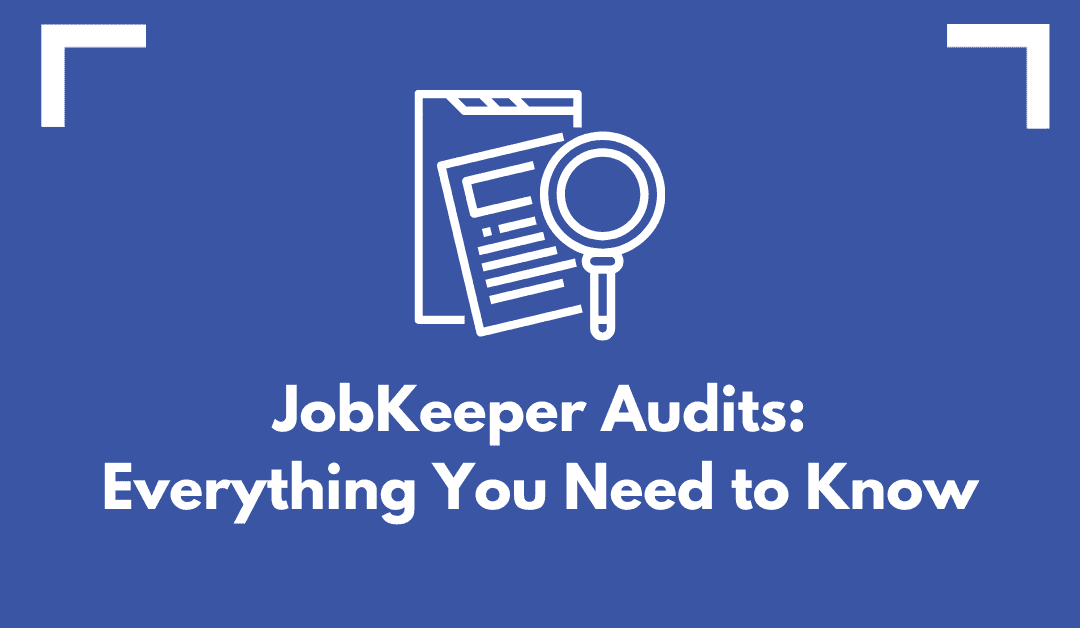
BY
|
JobKeeper Audits: How to Deal with the ATO
JobKeeper audits will form a big focus for the ATO as JobKeeper 1.0 comes to an end.
The ATO has assigned 3,000 staff to the review process of JobKeeper and Cashflow Boost with many accountants (including ourselves) expecting there to be some significant requests to prove eligibility for the program further.
As the Federal Government was keen to get the money to businesses that needed it as soon as possible, the JobKeeper scheme was a self-assessed program that released funds intending to review eligibility later.
So if you haven’t done your homework and kept records, then we suggest you read on in case you’re subject to a JobKeeper audit from the ATO.
What are JobKeeper Audits?
Along with super audits, JobKeeper audits will involve businesses and sole traders to provide taxable supplies in the form of verified documentation to prove that they experienced a 30%+ drop in turnover during the pandemic.
JobKeeper Audit Penalties
If you’re identified as being ineligible, or your application is considered fraudulent, it’s expected that you will need to repay all the wages as well as additional financial penalties.
At this stage, the ATO has not outlined what these penalties are, but based on previous audits, these are expected to be significant.
What will I need to supply during a JobKeeper audit?
If you do receive a call from the ATO as they would like to review your JobKeeper eligibility, here are a few steps you should take:
- Refrain from providing too much detail regarding the business during the phone call.
- Ask the ATO specifically:
- What information they require
- How would they like the information sent to them (email is best)
- When is the due date for the information
- Are they able to contact your accountant rather than you (if you have an accountant)
- Advise the ATO that you will need to get back to them with the information required
- Speak to your accountant or Box Advisory Services to act on your behalf
Another essential thing to note is that the ATO is an external auditor and will not know the ins and outs of your business as well as you do.
They don’t always get things right as the rules around JobKeeper is relatively new and complicated. Therefore, don’t be daunted by their position.
If you genuinely believe that your business is eligible for JobKeeper payments, then the outcome is generally favourable as long as you can produce the relevant records to prove this.
It’s expected that the ATO will request for documentation, known as taxable supplies, to be provided as proof of meeting the eligibility criteria. This may include:
- Bank statements
- Tax invoices
- Payslips
- Profit & loss statements
- Employee details (if you don’t use Single Touch Payroll)
- Employment contracts
- Application of turnover test
- Superannuation payments
Where are business owners most at risk of a JobKeeper audit?
As accountants, we’ve been strongly recommending that our clients keep accurate records and meet all of their employer obligations. Some areas that are subject to scrutiny include:
- Ensuring all employees are paid JobKeeper in the “one in, all in” principle
- Employees not passed on the full $1,500 per fortnight even if their regular wages are below this
- Invoices and bank statements match to reflect the appropriate decline in turnover.
- Falsification of any statements to meet the fall in turnover test
- Applying for the scheme despite not carrying on a business
What are the ATO’s JobKeeper audit targets?
Besides the risks outlined above, the ATO has specific areas that they’re expected to target:
- Increase in staff – reviews will be done on businesses that have increased staff levels after 1 March even though they’ve claimed for JobKeeper.
- Deferral of supplies – particular focus will be placed on industries that aren’t expected to be adversely affected by the pandemic. These industries will be made to prove why supplies were deferred and whether that was used to meet the turnover test.
- Bringing forward supplies – similar to the deferral of supplies, industries unaffected will be expected to prove why supplies were brought forward.
- Asset restructures – manipulation of asset ownership to a third company to reduce turnover will be scrutinised.
- Management fee manipulation – if management fees are reduced to help companies meet the turnover test.
- Payment reduction for subcontractors – businesses that have reduced or deferred payments to subcontractors to meet the turnover test will be reviewed.
- Reduction in cost of supplies to customers – where businesses and customers agree on reducing, waiving or deferring payments to enable the business to meet the turnover test
How can I ensure I’m compliant in case of a JobKeeper audit?
Get in touch with your accountant and work together in making sure that all your records reflect the eligibility criteria of JobKeeper.
Here are a few tips to ensure you will be compliant
- Lodge all 2019 – 2020 BAS and Tax returns up to date for your business
- Ensure you have paid your employees’ net wages and superannuation on time
- Prepare your Single Touch Reporting up to date.
- Keep up to date bank statements.
- Ensure you have withheld the correct amount of tax for your employees
- Maintain accurate and up to date accounting software
- Top up payroll for JobKeeper (up to $1,500 per fortnight)
- Ask an accountant for assistance with the lodgement of BAS, Tax Returns and JobKeeper declarations.
- Keep your work papers for the turnover test.
If you’re unsure or don’t have a current accountant you’re working with, get in touch with us to see how we can help you.
Sign up to our monthly newsletter where we share exclusive small business and contractor advice!
Disclaimer:
Please note that every effort has been made to ensure that the information provided in this guide is accurate. You should note, however, that the information is intended as a guide only, providing an overview of general information available to contractors and small businesses. This guide is not intended to be an exhaustive source of information and should not be seen to constitute legal or tax advice. You should, where necessary, seek a second professional opinion for any legal or tax issues raised in your business affairs.



